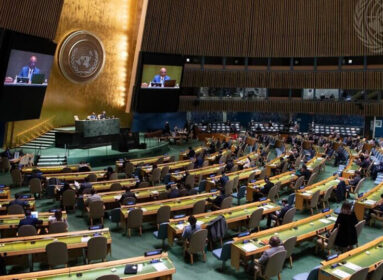
By Gabe Friedman
NEW YORK (JTA) — During a ceremony announcing the winners of the Genesis Generation Challenge, former New York City Mayor Michael Bloomberg wanted to set aside any confusion: “No, the [Genesis Prize] award will not go only to a ruggedly handsome international heartthrob named Michael,” he jested.
Bloomberg last year won the inaugural $1 million prize, bestowed by the Genesis Prize Foundation for “engagement and dedication to the Jewish community and/or the State of Israel.” This year’s prize went to another Michael, the movie star Michael Douglas.
Of course, neither Bloomberg, a self-made billionaire, nor Douglas, who commands millions per movie, need the money from Genesis, a charity founded and funded by a cadre of Russian billionaire philanthropists.
Even though Bloomberg referenced the Genesis Prize, that award is not to be confused with the Genesis Generation Challenge. Bloomberg launched the latter competition last summer with his Genesis Prize money, announcing in August that his winnings would be split into ten $100,000 awards for innovative projects “guided by Jewish values to address the world’s pressing issues.” It was stipulated that each team be led by someone aged 20 to 36.
Bloomberg’s prize money will finally go to work, as the nine winners of his competition, listed below, were announced at last week’s event. (The last $100,000 was used to fund the competition’s overhead.)
- Build Israel and Palestine (United States) – An organization that brings American Jewish and Muslim millennials together to build water infrastructure in Israel and the Palestinian territories.
- Building Up (Canada) – A non-profit that installs energy-efficient technology in affordable housing complexes in Toronto.
- eNable 3D Printed Prosthetic (United States, Haiti) – An initiative that provides free prosthetic limbs produced by 3D printers, advanced machines that create objects designed on computers, to people in countries affected by natural disasters, such as Haiti.
- Lavan (Israel) – An Israeli organization that will create a community of American angel investors to focus on projects that strengthen Israeli and Jewish values.
- Prize4Life (Israel) – An existing non-profit that is developing an app to help monitor ALS disease markers, which could lead to a better understanding of the rare degenerative condition also known as Lou Gehrig’s Disease.
- Sanergy (Kenya) – A project that aims to produce a sanitation plant for the Mathare district in Nairobi, Kenya.
- Sesame (Israel) – An organization that is producing a smartphone that can be used by disabled people who have no or limited use of their hands.
- Spark (Burundi) – An organization that provides poor, rural communities with micro-grants to design and implement their own social impact projects, such as the building of schools or health centers.
- Vera Solutions (United States, India) – A program that trains fellows in the U.S. and India in how to improve data systems for social impact organizations around the world.
“Some of the projects will exceed every expectation. Others will not – they may be dismal failures,” Bloomberg said at the event. “But every one of them deserves a shot.”
Before handing the microphone over to other speakers, such as Stan Polovets, co-founder and chairman of the Genesis Prize Foundation, and author and Nobel laureate Elie Wiesel, Bloomberg – who famously showed his support for Israel by flying to Tel Aviv at the height of last summer’s Gaza War – took a moment to talk U.S.-Israel relations.
“To see the truth about Israel and America, you have to look beyond the headlines and beyond the politics,” he said. “The fact is the economic and philanthropic ties between our countries is stronger than ever.”
CAP: The Sesame smart phone for people with disabilities.







 Southern New England Jewish Ledger
Southern New England Jewish Ledger















